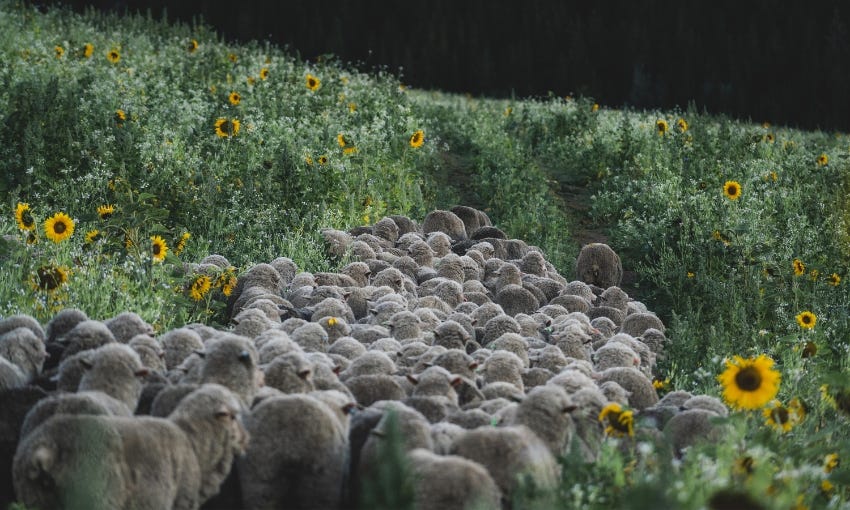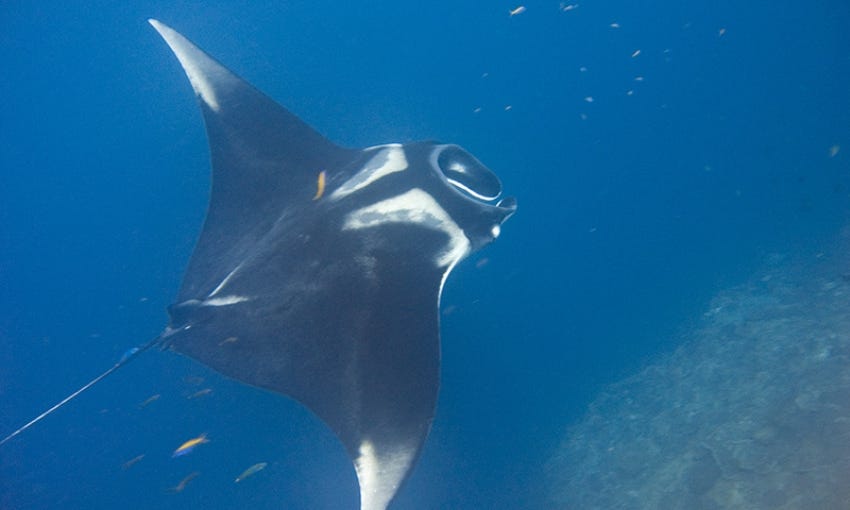Kia ora! Welcome to Future Proof brought to you by Electric Kiwi.
Merino sheep at Lake Hawea Station. Image credit: Lake Hawea Station.
Nestled in the rain shadow of the Southern Alps, Lake Hawea Station is home to around 4,500 breeding merino ewes, a couple of hundred Angus cattle, an eco-tourism operation, and the Ross family. It’s picturesque, and it’s also functioning as a pioneering experiment in on-farm environmental activism. (And yes, it’s the farm featured on Country Calendar last year that was deemed “controversial” by some viewers.)
Natives, not pines
Under the stewardship of the Ross family, the high country station became New Zealand’s first Toitū-certified carbon-zero farm a couple of years ago. Finn Ross, the carbon, biodiversity and sustainability director at the farm, says they produce around 2,500 tonnes of emissions, “which is a pretty big burden on the planet”. But on the other side of the ledger, he says, “we've got 5,000 tonnes of sequestration happening from regenerating native forests.” Ninety percent of the farm’s sequestration is native, with a few shelterbelts thrown in the mix. The family also undertakes pest control and stock exclusion to facilitate carbon-sucking regrowth. Ross says that the returning mountain beech forest is “beautiful” but the kōwhai groves are “the most special”. He’s passionate about connecting local farmers with opportunities to “protect their own backyard,” (rather than rely on offshore or pine-based offsets) and has started a company called Carbonz that does just that.
‘We've removed the need for urea completely’
It’s not just offsetting, though, as the Ross’ have cut emissions associated with nitrogen fertilizer and shifted to a regenerative style of farming. “We’ve stopped tillage at the farm,” says Finn. “There’s obviously a lot of soil loss when you till a paddock.” They’re looking to electrify their fleet of vehicles and are investigating the potential of seaweed food additives to reduce methane emissions from livestock. (In fact, Finn Ross is a PhD candidate studying seaweed as a climate solution.) Ross’ parents, Justine and Geoff, grew up on farms, but their “on-farm environmentalism” really started to snowball over the first three years of owning Lake Hawea Station, egged on by their son who was at university learning about the severity of the climate crisis. The farm is a “canvas” for trialing new ideas and the Ross’ hope it will be an exemplar – they’re planning to open their books later this year to prove that farming with a lighter impact on the earth is possible – and profitable too.
The hard mahi pays off
So is there any merit to the protestations of cost when it comes to environmental actions in agriculture? “I think it’s actually the opposite,” says Finn. “A lot of what we've done is actually helping the bottom line.” He points to things like reducing tractor hours and forgoing fertiliser as Earth-friendly cost-saving measures. Other benefits come in the form of “significant income through carbon credits” and the premium associated with marketing climate-positive products – like Allbirds’ M0.0NSHOT zero-carbon shoes, made with wool from the Hawea merinos.
Finn’s vision is for New Zealand to be “the regenerative food and fibre basket for the world.” But, he says, we’ve got a long way to go. He points to our threatened species record, unswimmable rivers, greenhouse gas emissions and high suicide rates among farmers as symptoms of a sector gone wrong. “[Wool], that commodity that we built our nation on, is now mostly just burned or buried because it has no value. So I think there's a lot of really strong signs that we have actually got it wrong as a sector over the last couple of decades,” says Ross. “And I think embracing this regenerative philosophy is an important next step – although that can sound a bit wishy-washy, I guess, it’s just about constantly questioning on-farm management, looking for ways to improve soil, animal health, people health, biodiversity.”
Master your pool pump with Electric Kiwi’s MoveMaster.
If you have a spa pool, chances are the cost of heating it is one of the major contributors to your power bill. Electric Kiwi's MoveMaster plan helps you limit that impact by offering half-price rates overnight (11pm-7am).
Making some small changes to your energy usage habits can be good for you and the environment.
Check out MoveMaster today and see how much you could be saving.
Got eco-anxiety?
Eco-anxiety can take a real toll on mental health, but a flurry of articles this week offer ways to cope. First up, recognise that anxiety is a completely normal response in the face of the climate emergency – but also that you’re not alone. In a comment in Nature, two researchers argue that personal climate anxiety is best reduced by planning and taking action to reduce personal climate risks. Or perhaps a prescription is in order, with research revealing that nature prescriptions produce positive physical and mental benefits. You could even turn to the medicine of laughter: The Guardian considers how comedians tackle climate change.
How are businesses and politicians performing on climate?
Otago University partnered with Stuff to develop the Climate Action Report Card, rating a range of New Zealand companies on their impact, transparency and alignment. The results, unsurprisingly, leave a lot of room for improvement. Meanwhile, The Detail podcast takes a stab at assessing Labour’s climate track record – it’s a mixed bag. Former prime minister Jacinda Ardern will be continuing her environmental work as a trustee of Prince William’s Earthshot prize, while King Charles describes himself as a “frustrated old man” when it comes to climate attitudes. On the other side of the political coin, National has released their first climate policy: speeding up consenting for renewable energy projects.
Nationwide revamp of waste services
You get a food scraps bin! And you get a bin! We all get food scraps bins! A new nationwide strategy for waste will see households across Aotearoa getting kerbside pick-up for food scraps, and clearer recycling guidelines. Unfortunately, the package did not include the popular container return scheme, which would have provided small refunds for returning bottles, cans and containers. It was scrapped by the government last month. A petition to bring back the scheme has already attracted a couple of thousand signatures. This comes as a national litter audit reveals that our waste woes are worsening, as reported by Tommy de Silva for The Spinoff.
A message from Spinoff editor Madeleine Chapman.
You're reading this because you value the work The Spinoff does in telling the stories of our people in our voices. As we head further into an already eventful 2023, we have a big job ahead of us. Covering the stories that matter to you is no small job. We’re a fiercely independent media company in Aotearoa but that also means we’re small and I think sometimes people forget how small our team is. I'm asking you to consider deepening your commitment to The Spinoff and the work we do by becoming a Spinoff Member. If you’re already a member, thank you for your support and advocacy - it's what keeps us going.
More stories:
There’s an inspiring predator-free story hidden on the $5 note, Allison Hess writes on The Spinoff
Big win for Vanuatu, as the UN passes a resolution that asks the world’s highest court to weigh in on climate justice
Earth’s population might peak sooner and lower than previously predicted
Grinding up old batteries could recover substantially more lithium during the recycling process
Enlisting animal allies: protecting and restoring wildlife can improve the natural capture and sequestration of carbon, a new study shows
On the When the Facts Change podcast, Bernard Hickey finds out what might happen to your insurance in a warming climate (and what you can do about it)
Australia has passed a significant climate law that requires industrial facilities to actually reduce their emissions, not just offset them
Deep ocean currents near Antarctica are set to weaken significantly in the next few decades, with big impacts for food chains, Hamish Cardwell reports for RNZ
Image credit: Jon Hanson/Flickr (CC BY-SA 2.0).
Congratulations to the oceanic manta ray for winning Te Ika o te Tau, Fish of the Year! Second place went to the tuna longfin eel, with the big-bellied seahorse taking out third. Manta rays have only recently received official welcome into New Zealand’s assemblage of native fauna, coming under the protection of the Wildlife Act in 2011. Kate Evans documents the phenomenon of manta rays in the Hauraki Gulf in this New Zealand Geographic piece, with fantastic photography by Richie Robinson.
Hoo-ray it’s a four-day weekend!
Ellen
PS – in bonus fishy news, scientists have filmed snailfish hanging out 8km deep in the ocean. Neat.
Got some feedback about Future Proof or topics you’d like covered? Get in touch with me at futureproof@thespinoff.co.nz













This is not just the future of farming. it is the future of all Woke business. All airlines just buy up these farms and forests to counter the kerosene being burnt by their jets. Job done.
Thank you for publishing this article. Very much admire the work that is being done here and to like to see their story told more widely. I did see the Country Calendar episode, and some of the dismissive commentary that followed. We desperately need the wider farming community to embrace change and move toward more environmentally sustainable solutions - and the same goes for us all.